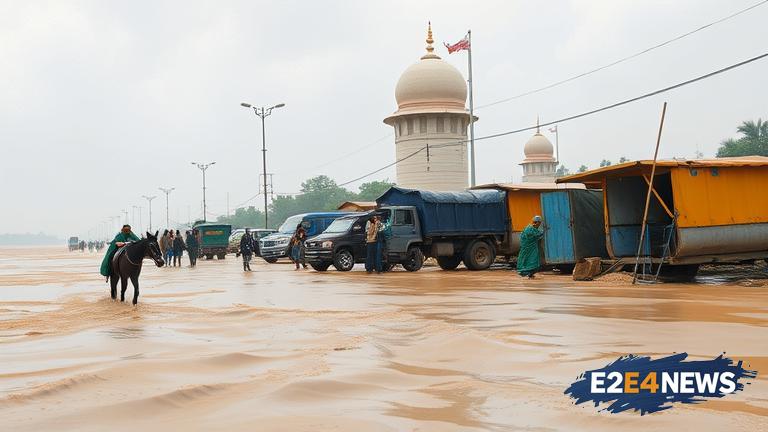A severe flood warning has been issued in eastern Pakistan as India releases excess water from its swollen rivers, resulting in mass evacuations and widespread destruction. The affected areas include the provinces of Punjab and Khyber Pakhtunkhwa, where thousands of people have been forced to leave their homes. The flooding has been caused by heavy monsoon rains in India, which have led to a significant increase in water levels in the rivers. The Indian government has been releasing excess water from its dams, which has resulted in a surge of water flowing into Pakistan. The Pakistani government has issued a warning to people living in low-lying areas to evacuate immediately, as the floodwaters are expected to rise further. The evacuations are being carried out by the Pakistani army and other emergency services, who are working to rescue people stranded in flooded areas. The flooding has caused significant damage to infrastructure, including roads, bridges, and homes. The affected areas are also experiencing power outages and disruptions to communication services. The Pakistani government has declared a state of emergency in the affected areas and is working to provide relief to those affected. The government has also appealed for international aid to help deal with the crisis. The flooding has also affected agricultural land, with thousands of acres of crops destroyed. The economic impact of the flooding is expected to be significant, with estimates suggesting that the damage could run into millions of dollars. The Pakistani government has promised to provide compensation to those affected, but many people are still waiting for help to arrive. The situation is being closely monitored by the international community, with many countries offering aid and assistance to Pakistan. The United Nations has also issued a statement expressing concern over the situation and offering support to the Pakistani government. The flooding has also raised concerns over the potential for water-borne diseases, with many people at risk of contracting illnesses such as cholera and diarrhea. The Pakistani government has set up medical camps in the affected areas to provide treatment to those affected. The flooding has also disrupted the supply of clean water, with many people forced to drink contaminated water. The situation is expected to worsen in the coming days, with more rain forecast in the region. The Pakistani government is working to mitigate the effects of the flooding, but the situation remains critical. The international community is urged to provide support to Pakistan to help deal with the crisis. The flooding has also highlighted the need for better management of water resources in the region, with many experts calling for more cooperation between India and Pakistan to prevent such disasters in the future.
